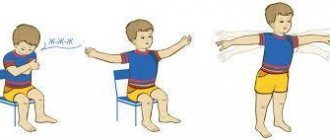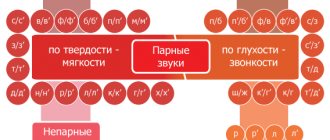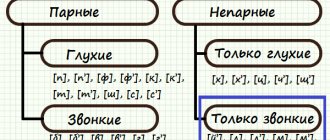Article:
In the development of a child, all cognitive processes are interconnected.
And disturbances that occur in one of them will certainly have an impact on other processes. Speech is one of the most important cognitive processes, the development of which affects a person’s relationship with the outside world, and therefore the very development of a person’s personality. Therefore, understanding the specifics of working with children with general speech underdevelopment is necessary. “General speech underdevelopment is various complex speech disorders in which children have impaired formation of all components of the speech system related to its sound and semantic side, with normal hearing and intelligence . At the same time, the general underdevelopment of speech is systemic in nature, that is, in the child’s speech there is a violation of the development of all aspects of speech: lexical. grammatical, syntactic, pronunciation. General underdevelopment of speech is considered to be an external manifestation of such diagnoses as: dysarthria, rhinolalia, stuttering, alalia, hearing impairment, decreased intelligence, and insufficient phonemic hearing.
The following levels of general speech underdevelopment are distinguished:
OHP level 1. The child has practically no speech. The active vocabulary is poor. When forming speech utterances, the child uses mainly babbling words, the first syllables, and onomatopoeia. The child actively uses gestures and facial expressions, understands speech addressed to him (rich passive vocabulary). A child with the first level of general speech underdevelopment has his own specific “language” of communication with the outside world.
OHP level 2. The child uses a certain limited number of words in his speech. Poor active vocabulary, words are pronounced in a distorted form. Does not know how to combine objects into a group, does not know the basic characteristics of objects, can pronounce simple words depending on their number, there is no agreement between words in simple sentences. The child can compose a coherent story, but mostly uses two-syllable, inconsistent sentences consisting of a subject and a predicate.
OHP level 3. General underdevelopment of speech is manifested in a lag in the grammatical and phonemic development of speech. Large active and passive vocabulary, the child uses detailed phrases, active expressive speech. Unclear pronunciation of sounds, often replacing more complex sounds with simple ones. Whistling, hissing, sonorant and affricates are the most difficult sounds to pronounce. The child finds it difficult to grammatically coordinate words, especially nouns with numerals. Can compose a story that contains a certain sequence of actions.
OHP level 4. The sound pronunciation is correct, but the articulation is incorrect, which means the speech is slurred. Sometimes the child skips syllables in words, rearranges them or replaces sounds. Difficulties in using words denoting the characteristics of an object. The process of word formation is also difficult, especially with the help of suffixes. Agreements between words in a sentence, especially nouns and adjectives, are difficult.
Children with general speech underdevelopment are also characterized by insufficient development of processes closely related to speech activity, namely: attention and memory are impaired; impaired finger and articulatory motor skills; verbal and logical thinking is insufficiently formed. Since speech and thinking are closely related, the verbal and logical thinking of children with speech underdevelopment is below the age norm. General underdevelopment of speech also affects the behavior and well-being of the child. Therefore, it is necessary to instill in such children the norms of communication in a team, without which full-fledged education and upbringing is impossible. It is necessary to monitor the pronunciation side of speech, and, if necessary, correct the child’s speech correctly and tactfully. it is necessary to pay special attention to improving the articulatory apparatus and fine motor skills, since its development is directly related to the mental, and therefore speech, development of the child. Carrying out work to consolidate children’s speech skills and constantly replenish children’s vocabulary. A special role in the development of a child is played by classes in design, modeling, appliqué, and drawing. When conducting individual lessons, the child’s attention is focused on words and sounds that cause particular difficulties. All speech development tasks for children with special needs must be supported by visual material. That is why individual lessons with children are recommended to be carried out in various rooms of the kindergarten. During walks, you can draw the attention of a child with OHP to compare the signs and properties of the living and inanimate objects around him. Working with parents is no less important, since the family is the primary socializer of the child. You can unobtrusively and delicately recommend to parents certain exercises, tasks, games that would contribute to the development of their child. Thus, the features of working with preschool children with ODD consist in the coordinated work of the teacher, speech therapist, educational psychologist and the child’s parents, in special attention to the issue of development of the pronunciation side of speech, which consists of continuous, daily, systematic work on the development of the pronunciation side of speech child, replenishing his vocabulary.
When should you start worrying?
As we noted above, there are many reasons why a child’s speech development lags behind. First, be attentive to your baby's speech development. If there is a delay in the very first elements of speech (humming, babbling, the appearance of the first words), be sure to consult a neurologist. The doctor may suggest additional studies of the brain and its blood supply in order to exclude or promptly correct problems with delayed speech formation. But this is ideal, in reality this does not always happen; very often, at the first signs of a problem, doctors can say something like “no problem, it’s all individual” or “up to three years you may not say anything at all, wait.” But time passes and, as a rule, the beginning of speaking after two years results in serious problems in the future. Among them are general underdevelopment of speech in preschool age, and difficulties in mastering writing and reading at school.
Secondly, these are also physiological problems that are not always detected on time. This is hearing loss due to which the child cannot correctly hear what others are saying, and all sorts of pathologies of the speech organs that do not allow him to correctly reproduce words. As a rule, they are discovered at an appointment with an ENT specialist or speech therapist. Adults should pay attention if the child often asks again or confuses similar sounds. In any case, if you notice that your baby speaks worse than most of his peers, you need to contact a specialist as soon as possible.
General speech underdevelopment. OHP 1, 2, 3, 4 level. The child speaks poorly.
This includes children with mildly expressed residual manifestations of lexico-grammatical and phonetic-phonemic underdevelopment of speech. Minor violations of all components of the language are identified during a detailed examination when performing specially selected tasks.
In the speech of children, there are isolated violations of the syllabic structure of words and sound content. Eliminations predominate, mainly in the reduction of sounds, and only in isolated cases - omission of syllables. Paraphasias are also observed, more often - rearrangements of sounds, less often of syllables; a small percentage is perseveration and addition of syllables and sounds.
Insufficient intelligibility, expressiveness, somewhat sluggish articulation and unclear diction leave the impression of overall blurred speech. The incompleteness of the formation of the sound structure and the mixing of sounds characterize the insufficient level of differentiated perception of phonemes. This feature is an important indicator of the process of phoneme formation that has not yet completed.
Along with deficiencies of a phonetic-phonemic nature, individual violations of semantic speech were also found in these children. Thus, with a fairly diverse subject dictionary, there are no words denoting some animals and birds ( penguin, ostrich
), plants (
cactus, loach
), people of different professions (
photographer, telephone operator, librarian
), body parts (
chin, eyelids, feet
).
When answering, generic and specific concepts are mixed (crow, goose - bird
, trees -
fir trees
, forest -
birch trees
).
When denoting the actions and characteristics of objects, some children use typical names and names of approximate meaning: oval - round; rewrote - wrote
.
The nature of lexical errors is manifested in the replacement of words that are similar in situation ( uncle paints the fence with a brush
- instead of “uncle paints the fence with a brush;
the cat rolls the ball
- instead of “ball”), in the mixing of signs (high fence -
long
; brave boy -
fast
; grandfather old -
adult
).
Errors in use remain persistent:
1. diminutive nouns
2. nouns with singularity suffixes
3. adjectives formed from nouns with different meanings of correlation ( fluffy
– downy;
cranberry
- cranberry;
s'osny
– pine);
4. adjectives with suffixes characterizing the emotional-volitional and physical state of objects ( boastful
– boastful;
ulybkiny
- smiling);
5. possessive adjectives ( volkin
– wolf;
fox
- fox).
Against the background of the use of many complex words that are often encountered in speech practice (leaf fall, snowfall, airplane, helicopter, etc.), persistent difficulties are noted in the formation of unfamiliar complex words (instead of a book lover - a book lover
;
icebreaker - legopad, legotnik, dalekol
;
beekeeper - bees, beekeeper, beekeeper
;
steelmaker - steel, capital
).
It can be assumed that these manifestations are explained by the fact that due to limited speech practice, children, even in a passive way, do not have the opportunity to assimilate the listed categories.
It should be added that it was possible to detect these gaps in vocabulary acquisition only through a scrupulous examination using extensive lexical material. As a study of practical experience in diagnosing speech underdevelopment has shown, speech therapists, as a rule, limit themselves to presenting only 5-6 words, many of which are frequently used and well known to children. This leads to erroneous conclusions.
When assessing the formation of the lexical means of a language, it is established how children express “systemic connections and relationships that exist within lexical groups.” Children with the fourth level of speech development quite easily cope with the selection of commonly used antonyms indicating the size of an object (large - small), spatial opposition (far - close), and evaluative characteristics (bad - good). Difficulties are manifested in expressing the antonymic relationships of the following words: running - walking, running, walking, not running
;
greed is not greed, politeness
;
politeness - evil, kindness, not politeness
.
The correctness of naming antonyms largely depends on the degree of abstraction of the proposed pairs of words.
Not all children also cope with the differentiation of verbs that include the prefixes “oto”, “you”: words that are close to synonyms are more often selected (bend - bend
;
let in – launch
;
roll up - roll up
;
take away - take away
).
The insufficient level of lexical means of the language is especially clearly evident in these children in the understanding and use of words, phrases, and proverbs with a figurative meaning. For example, “as ruddy as an apple” is interpreted by the child as “he ate a lot of apples”; “collide nose to nose” - “hit noses”; “hot heart” – “you can get burned”;
Analysis of the features of the grammatical design of children's speech allows us to identify errors in the use of nouns in the genitive and accusative plural cases, complex prepositions ( at the zoo they fed squirrels, foxes, dogs
);
in the use of some prepositions ( looked out of the door
- “looked out from behind the door”;
fell from the table
- “fell from the table”;
the ball lies near the table and chair
- instead of “between the table and chair”). In addition, in some cases there are violations of the agreement of adjectives with nouns, when there are masculine and feminine nouns in the same sentence.
The insufficient formation of lexical and grammatical forms of the language is heterogeneous. Some children show a small number of errors, and they are inconsistent in nature, and if children are asked to compare the correct and incorrect answer options, the choice is made correctly.
This indicates that in this case the formation of grammatical structure is at a level approaching the norm.
Other children have more persistent difficulties. Even when choosing the correct sample, after some time in independent speech, they still use erroneous wording. The peculiarity of the speech development of these children slows down the pace of their intellectual development.
At the fourth level, there are no errors in the use of simple prepositions, and there are minor difficulties in agreeing adjectives with nouns. However, difficulties remain in using complex prepositions and in coordinating numerals with nouns. These features appear most clearly in comparison with the norm.
Particularly difficult for these children are sentence constructions with different subordinate clauses:
1) missing conjunctions ( mom warned me, I didn’t go far
– “so that I don’t go far”);
2) replacement of conjunctions ( I ran where the puppy was sitting
- “where the puppy was sitting”);
3) inversion ( finally, everyone saw the kitten they had been looking for for a long time
- “we saw a kitten that we had been looking for for a long time”).
The next distinctive feature of children at the fourth level is the uniqueness of their coherent speech.
1. In a conversation, when composing a story on a given topic, a picture, a series of plot pictures, violations of the logical sequence, “getting stuck” on minor details, omissions of main events, repetition of individual episodes are noted;
2. When talking about events from their lives, composing a story on a free topic with elements of creativity, they mainly use simple, uninformative sentences.
3. Difficulties remain in planning your statements and selecting appropriate linguistic means.
Filicheva T.B.
Features of speech formation in
General underdevelopment of speech - overcoming.
Step 1. Working with a speech therapist
“My child is already diagnosed with ODD, what should I do?” someone asks. Let's remember that this problem has many causes and consequences, so to get out of it with minimal losses you definitely need the support of a speech therapist. You will have to study a lot, both with specialists and at home. At least once (and often twice) a week it is necessary to work with a speech therapist. The classes will include special games and exercises that will help the child increase his vocabulary, learn to understand and use words correctly, and build coherent and competent sentences.
A program is individually selected and developed for each child. The basis - the development of the grammatical structure of speech and the formation of the ability to correctly construct speech statements - is complemented by all kinds of games that stimulate thinking, memory, and attention. After all, speech does not exist on its own; it is a participant in the process of communication and learning. In addition, speech therapists use all kinds of materials in their work that develop finger dexterity and skill. The areas of the cerebral cortex responsible for the development of speech and the development of fine motor skills are located nearby, stimulating one specialist and having a beneficial effect on the other. There is even such an expression as “intelligence at your fingertips.”
Sound pronunciation will not be left without attention. With general underdevelopment of speech, as a rule, there are difficulties in pronouncing a number of sounds, which is also part of the work of a speech therapist. Such an integrated approach helps to overcome difficulties and has a positive effect on the development of the child as a whole.
Step 2. Your support.
The speech therapist will do everything in his power, but the work of a specialist alone is not enough. The child should become interested in speaking, in communicating something about himself to the world around him and, first of all, to the people closest to him.
A little later we will tell you how underdevelopment of speech can affect the emotional state of a child. For now, let’s just note that correct construction of phrases, selection of the right words, searching for answers to questions asked by adults, pronouncing artificial sounds - all this is difficult work for a child, and he must be sure that you will wait for him to cope with it and help if necessary. You must be extremely patient and attentive when communicating with a child who speaks poorly.
Only if he sees that no matter how ugly and incorrect his speech is, it is important to those around him that he speaks to them, that he is trying to build interaction with them, will the child be able to believe that he is accepted for who he is. And, therefore, he will have less fears and more resources to overcome all difficulties.








